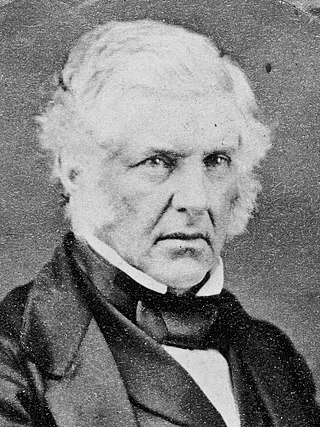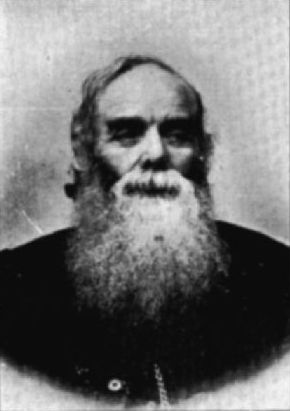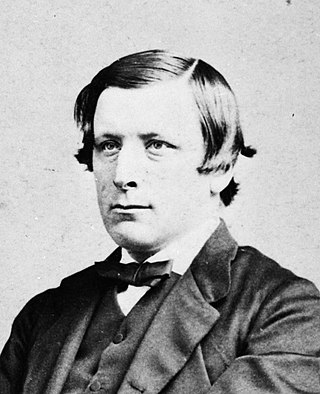Related Research Articles
The 2nd New Zealand Parliament was a term of the Parliament of New Zealand. It opened on 15 April 1856, following New Zealand's 1855 election. It was dissolved on 5 November 1860 in preparation for 1860–61 election. The 2nd Parliament was the first under which New Zealand had responsible government, meaning that unlike previously, the Cabinet was chosen by Parliament rather than by the Governor-General of New Zealand.
Lyttelton is a former New Zealand parliamentary electorate. It existed from 1853 to 1890, and again from 1893 to 1996, when it was replaced by the Banks Peninsula electorate.
Cheviot was a parliamentary electorate in the Canterbury region of New Zealand, from 1858 to 1890. It was named after what was then one of the country's largest sheep stations, Cheviot Hills.
Dunedin Country was a parliamentary electorate in the rural area surrounding the city of Dunedin in Otago, New Zealand, from 1853 to 1860. It was a two-member electorate and was represented by a total of five members of parliament.
Lincoln was a parliamentary electorate in the Canterbury region of New Zealand from 1881 to 1890. It was represented by two Members of Parliament.
Christchurch Country was a parliamentary electorate in the Canterbury region of New Zealand from 1853 to 1860. It was thus one of the original 24 electorates used for the 1st New Zealand Parliament.
Christchurch was a parliamentary electorate in Christchurch, New Zealand. It existed three times. Originally it was the Town of Christchurch from 1853 to 1860. From the 1860–1861 election to the 1871 election, it existed as City of Christchurch. It then existed from the 1875–1876 election until the 1881 election. The last period was from the 1890 election to the 1905 election. Since the 1946 election, a similarly named electorate called Christchurch Central has been in existence.

Isaac Thomas Cookson was a 19th-century Member of Parliament in Canterbury, New Zealand. He was a prominent merchant in early Canterbury.

John Ollivier was a Member of Parliament in New Zealand, but was better known for his membership of the Canterbury Provincial Council. He was the second chairman of the Christchurch Town Council.
William Thomson was a 19th-century politician from Christchurch, New Zealand, originally from Scotland. He held office at all levels of government, from Parliament and Provincial Council to chairman of a road board. In his professional life, Thomson was an auctioneer, accountant and commission agent. He had rural holdings in Governors Bay and at the Esk River.

Joseph Brittan was a New Zealand surgeon, newspaper editor, and provincial councillor, was one of the dominant figures in early Christchurch. Born into a middle-class family in southern England, he followed his younger brother Guise Brittan to Christchurch, where he and his wife arrived in February 1852 with four children. Joseph Brittan soon got involved in the usual activities of early settlers and gained prominence in doing so. He had bought 100 acres on 10 July 1851 and took up 50 of this to the east of Christchurch that he converted to farmland. There, he built the family residence, and the suburb of Linwood was subsequently named after Brittan's farm and homestead of Linwood House.

The Town of Christchurch by-election in 1860 was triggered by the resignation of Richard Packer as the Member of the House of Representatives for the Town of Christchurch electorate, and occurred during the term of the 2nd New Zealand Parliament. The previous representative of the electorate, the politician Henry Sewell, had returned after three years in England and the general expectation was that Sewell would be the sole contender for election. The Lyttelton Times wrote several provocative editorials, generally endorsing Sewell for his obvious ability, but criticising him for not publicly talking about his policies and plans. Sewell eventually arranged a public meeting the evening prior to nomination day; this was the only public meeting during the election campaign. After a lengthy address, which was favourably received by the Lyttelton Times, a second contender for the office put his name forward at that meeting: the publican Michael Hart. Sewell, a former premier and one of New Zealand's most senior politicians at the time, was successful against the political novice Hart.

A 1889 by-election in the Lincoln electorate was held to fill a vacancy caused by the resignation of Arthur O'Callaghan from the Lincoln electorate. The by-election was won by Alfred Saunders, who beat John Ollivier.

The Christchurch Country by-election 1856 was a by-election held in the multi-member Christchurch Country electorate during the 2nd New Zealand Parliament, on 14 October 1856, and was, along with the Grey and Bell 1856 by-election, the second equal contested by-election in New Zealand political history.
The Town of Christchurch by-election of 1856 was a by-election held in the Town of Christchurch electorate during the 2nd New Zealand Parliament, on 18 November 1856.

The Dunedin Country by-election 1858 was a by-election held in the multi-member Dunedin Country electorate during the 2nd New Zealand Parliament, on 16 June 1858. The by-election was caused by the resignation of incumbent MP John Cargill and was won by John Taylor.

The 1865 Town of New Plymouth by-election was a by-election held in the Town of New Plymouth electorate during the 3rd New Zealand Parliament, on 19 May 1865. The by-election was caused by the resignation of the incumbent, Charles Brown, and was won unopposed by Henry Sewell. Whilst Sewell was not a local resident, he was a member of the government through his appointment to the Legislative Council, the upper house of Parliament. Sewell accepted the invitation to represent the electorate, as him becoming a member of the lower house was seen to strengthen the government.
The Dunedin Country by-election 1860 was a by-election held in the multi-member Dunedin Country electorate during the 2nd New Zealand Parliament. The by-election was caused by the resignation of incumbent MP William Cargill. The nomination meeting was held on 28 March and as Thomas Gillies was the only person proposed, he was declared elected unopposed.

The 1868 Avon by-election was a by-election held on 8 June during the 4th New Zealand Parliament in the Christchurch electorate of Avon.
George Arthur Emilius Ross was a New Zealand farmer and provincial politician. A cultured and well-educated man, he suffered a breakdown while at Oxford University and relocated to Christchurch for health reasons before he finished his degree. After a short period as a cadet to learn the basics of sheep farming, he became a major land owner. He was an elected member of the Canterbury Provincial Council for the rural Rakaia electorate and was on the Canterbury Provincial Executive Council on a number of occasions including nearly two years as provincial treasurer. Well-liked as an individual, he was chaotic as a businessman and went bankrupt after a harsh winter in 1867 that caused great loss of stock. He suffered a mental breakdown and disappeared from public life thereafter, with his young wife, Sibella, sustaining the family by running a school that her parents had financed for them. Ross died young aged 48 and his wife outlived him by five decades, bringing up a family of eight children by herself. The West Coast town of Ross was named after him during his lifetime.
References
- Wilson, James Oakley (1985) [First ed. published 1913]. New Zealand Parliamentary Record, 1840–1984 (4th ed.). Wellington: V.R. Ward, Govt. Printer. p. 191. OCLC 154283103.